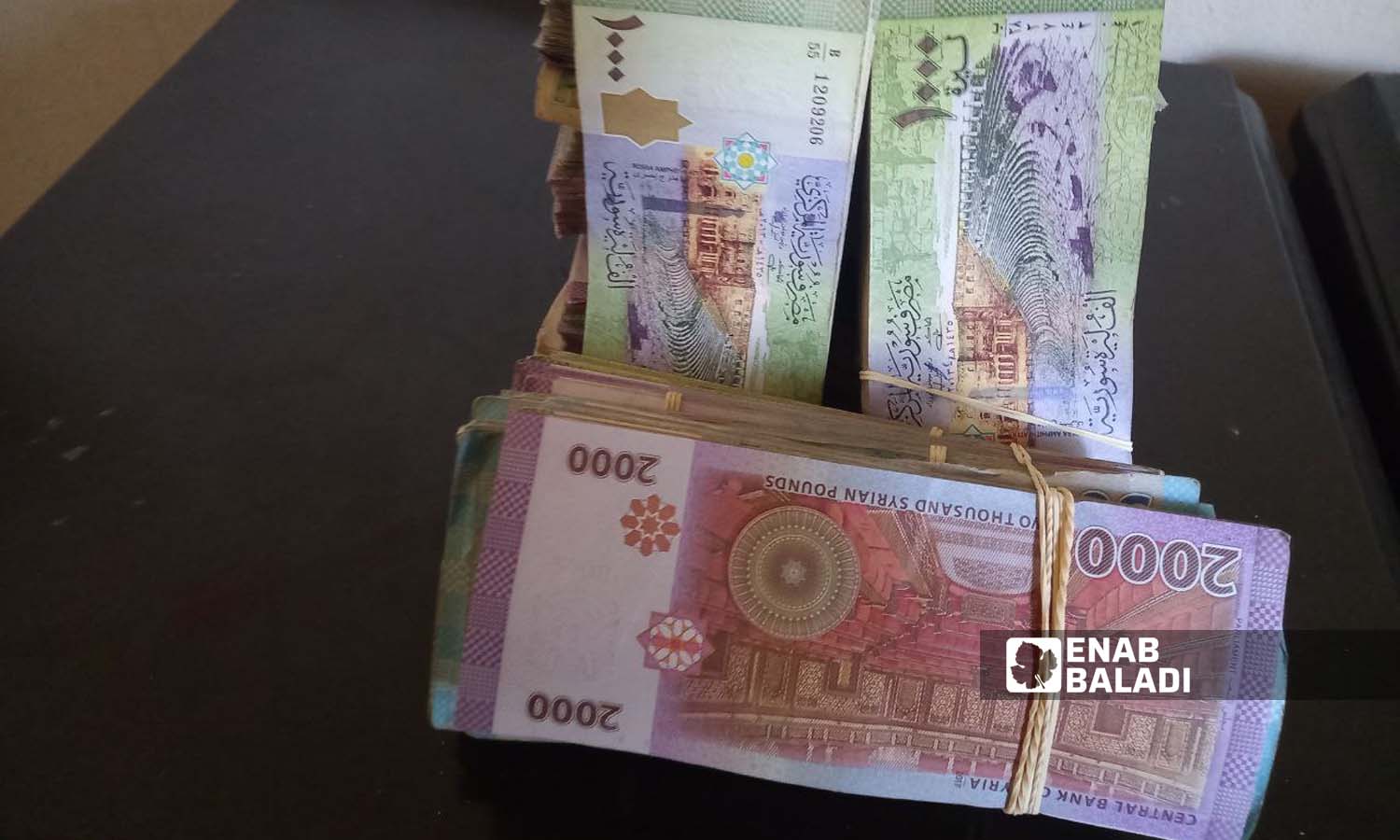



Daraa – Halim Muhammad
Ahmed, 38, monitors the exchange rate bulletins of the Syrian pound against the US dollar. Once the pound started to decline, he rushed and converted his savings of 6 million Syrian pounds to 1567 US dollars.
Following the pound depreciation (3900 SYP for 1 USD on 9 March), the residents of Houran Plain in the southern Daraa region are seeking to convert their currency into dollars for fear of losing its value, while others resorted to buying gold.
The depreciation of the Syrian pound was accompanied by the Russian war on Ukraine and the difficulties experienced by the Syrian economy. Meanwhile, the regime’s government issues decisions that make these difficulties even worse, including the subsidies termination for more than 500,000 Syrian families, in times when the prices of basic materials almost repeatedly rise.
Ahmed, whose full name has not been disclosed by Enab Baladi for security reasons, said that it was the first time that he has converted Syrian currency into dollars, despite previous collapses during the past years. But this drop is frightening because it is related to Russia’s war on Ukraine.
Jihan, 28, who declined to give her full name for security reasons, reckoned that converting the money in her possession into gold was a more suitable way to deal with the gravity of the fluctuating exchange rates.
“I bought gold bracelets for 3 million SYP that I had”, she told Enab Baladi while asserting that she thinks that “gold is more stable than currency conversion, and it is not subject to speculation.”
On the other hand, the 55-year-old Abu Mohammed (a pseudonym for security reasons) believes that the answer lies in investing this money by purchasing real estate in order to make more money. In his opinion, all options are good except to keep the Syrian pound, which is likely to collapse.
Enab Baladi interviewed a money-changer (who asked not to be named), and he stated that there is heavy popular demand on the dollar while the exchange rate is fluctuating. However, demand on the dollar currently prevails.
Food prices rose in conjunction with the start of the collapse of the Syrian pound last week; the cost of 1 kilogram of sugar went from 2,500 SYP (about 56 US cents) to 2,700 SYP (70 US cents).
The price of 1 kilogram of long-grain rice jumped from 6,000 SYP (1.56 USD) to 7,500 SYP (1.95 USD), while 1 kilogram of tea went from 25,000 SYP (6.52 USD) to 29,000 SYP (7.57 USD). 1 liter of cooking oil used to cost 7,500 SYP (1.59 USD), it now costs 13,000 SYP (3.3 USD).
Once the Russian war on Ukraine began on 24 February, the Syrian economy was once again hit by a decline in the value of the pound and a remarkable rise in prices. Russia, the regime’s savior from the sanctions imposed upon it, is currently preoccupied with a war that is not expected to end.
The Minister of Finance of the opposition’s Syrian Interim Government (SIG), Abdulhakim al-Masri, told Enab Baladi that the Syrian pound had begun to gradually decline the way that “ants crawl” so that the population would not sense the dangers of this decline.
Al-Masri believes that it is natural for some residents to convert their money into gold. With the start of the fighting in Ukraine, the price of one gram of gold increased by an additional 4 dollars.
On the reason behind the population’s fear of currency collapse, al-Masri explained that the weakness of the Syrian economy is caused by the lack of domestic product, which is currently limited to services and employee salaries.
The regime had lost the returns of basic sectors such as oil, which used to contribute to 24 percent of the gross domestic product (GDP). This has moved the regime from a status of an oil exporter to one where it is an importer. In addition, industry, agriculture, as well as tourism are currently losing sectors.
The regime’s budget deficit for the current year amounted to 4.5 trillion Syrian pounds, 2 trillion Syrian pounds more than what was recorded in 2021, al-Masri added.
He also predicted an inconceivable price hike, which is a consequence of the rise in oil and gas prices and international transport costs. The regime was circumventing economic sanctions by transferring currencies through Russia, which is now also being sanctioned by countries around the world.
Al-Masri linked the Russian war on Ukraine to the weakness of the Syrian economy, considering that Russia was supporting the Syrian regime through remittances, wheat, and certain food products, all of which will now cease in light of the ongoing war.
if you think the article contain wrong information or you have additional details Send Correction